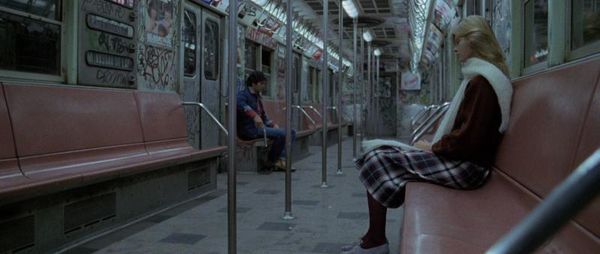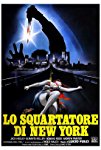Eye For Film >> Movies >> The New York Ripper (1982) Film Review
The New York Ripper
Reviewed by: David Graham

Lucio Fulci's audaciously sleazoid slasher is designed to provoke as much outrage as possible, but it also just about cuts it as a classically-styled giallo thriller. As with much of his work, Fulci's wonky logic can be off-putting but it definitely keeps the viewer on their toes and makes more sense in retrospect. His film is charmingly dated in some respects, painting a pretty authentic portrait of a lawless NYC of boundless depravity, but it also remains alarmingly vicious today; it's not hard to see why the BBFC still won't release it uncut.
Post-Son Of Sam, New York City has become a haven for society's undesirables, with rampant drug use and the booming sex industry blighting the island of Manhattan. A new serial killer makes himself known to the police through a series of telephone taunts and a trail of butchered women, the force's attempts to track him down making his attacks take on a more personal dimension. An ageing detective, skeptical psychologist and the murderer's sole survivor all become pawns in his cruel game of cat and mouse, as clues, red herrings and bodies pile up around them.

The New York Ripper is a brash little shocker that is in many ways deeply flawed and hopelessly derivative, but it's undeniable that it's also deliriously inventive and even surprisingly self-aware. Deceptive dream sequences, random flashbacks and intensely demented phone calls combine with the film's pervasive atmosphere of sexual deviance to give it a delightfully lurid pull; it's every bit as nonsensical as Fulci's supernatural zombie epics but it also carries a lingering sado-masochistic streak that resonates long after its literally explosive climax.
The film echoes the likes of Straw Dogs in its dubious treatment of women as sexual provocateurs, but it also paints a nihilistic portrait of men as grotesquely predatory beings.
Fulci so brazenly depicts misogyny that his film can be seen as an attack on the sort of attitudes towards women he's been accused of embodying. Most of the victims are headstrong modern females who are comfortable with their sexuality and in near-constant conflict with oppressive chauvinism. Some well-observed moments catch the viewer off-guard; one victim's husband describes helplessly but non-judgmentally the sort of laissez-faire relationship they enjoyed, while a sex performer's post-show ennui speaks volumes about the desensitisation that all this proclivity causes.
Sexual repression and aggression are both shown to be dangerous, Fulci toying with our expectations through encounters that find women looking for kicks ending up in trouble over their heads. It's all very flimsy if it's to be taken as discourse, walking a fine line between exploitation and outright objectification, but it's not quite as offensive as the likes of I Spit On Your Grave. The ending takes a bizarre turn that doesn't really tie in with what's gone before, giving an emotional explanation for the carnage that doesn't fit with its sexual overtones, but at least we're given a (completely ridiculous and therefore hilarious) reason for the killer's infamous vocal styling.
The mostly concealed attacker is made immediately memorable by his adoption of a screeching Donald Duck register; viewers will variously find it wildly amusing, insidiously disturbing or deeply irritating, but there's no denying it gives the kills an air of unhinged menace. There are several excruciatingly tense set-pieces, exacerbated by the insane quacking and how horrifically discomfiting the deaths are.
While much of the violence employs the genre's standard POV perspective and Fulci's preferred close-up FX ogling, the director also pulls off a series of disarmingly imaginative shots: the attacks are often directed at the viewer, with weapons frequently lunging out of the screen at the audience. We even witness a throat-slashing from inside one victim's neck, a crude attempt at emulating Argento's bravura style that is nevertheless shockingly effective.
It's by no means a classic, hampered by the usual woeful dubbing and some very haphazard plotting, but The New York Ripper shouldn't be dismissed just for its unapologetic violence. It's a stark and accomplished horror thriller, making good use of its unsanitised locations and showing Fulci fearlessly plunging full-throttle into territory that would make many lesser directors balk. It's not quite up there with the director's best, but it's a lot better than everything he did afterwards, at times even comparing favorably to his and Dario's 70s classics of the Italian giallo genre.
Reviewed on: 24 Aug 2011

















